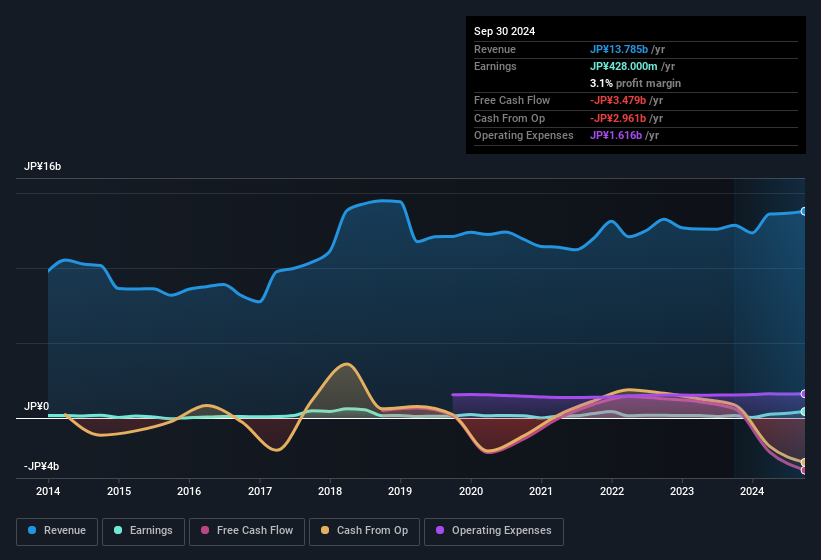We Think That There Are Issues Underlying Ishikawa Seisakusho's (TSE:6208) Earnings

Ishikawa Seisakusho, Ltd. (TSE:6208) announced strong profits, but the stock was stagnant. Our analysis suggests that shareholders have noticed something concerning in the numbers.
See our latest analysis for Ishikawa Seisakusho

Zooming In On Ishikawa Seisakusho's Earnings
As finance nerds would already know, the accrual ratio from cashflow is a key measure for assessing how well a company's free cash flow (FCF) matches its profit. In plain english, this ratio subtracts FCF from net profit, and divides that number by the company's average operating assets over that period. This ratio tells us how much of a company's profit is not backed by free cashflow.
That means a negative accrual ratio is a good thing, because it shows that the company is bringing in more free cash flow than its profit would suggest. That is not intended to imply we should worry about a positive accrual ratio, but it's worth noting where the accrual ratio is rather high. To quote a 2014 paper by Lewellen and Resutek, "firms with higher accruals tend to be less profitable in the future".
Ishikawa Seisakusho has an accrual ratio of 0.37 for the year to September 2024. As a general rule, that bodes poorly for future profitability. And indeed, during the period the company didn't produce any free cash flow whatsoever. Even though it reported a profit of JP¥428.0m, a look at free cash flow indicates it actually burnt through JP¥3.5b in the last year. It's worth noting that Ishikawa Seisakusho generated positive FCF of JP¥621m a year ago, so at least they've done it in the past. One positive for Ishikawa Seisakusho shareholders is that it's accrual ratio was significantly better last year, providing reason to believe that it may return to stronger cash conversion in the future. As a result, some shareholders may be looking for stronger cash conversion in the current year.
Note: we always recommend investors check balance sheet strength. Click here to be taken to our balance sheet analysis of Ishikawa Seisakusho.
Our Take On Ishikawa Seisakusho's Profit Performance
As we have made quite clear, we're a bit worried that Ishikawa Seisakusho didn't back up the last year's profit with free cashflow. For this reason, we think that Ishikawa Seisakusho's statutory profits may be a bad guide to its underlying earnings power, and might give investors an overly positive impression of the company. The silver lining is that its EPS growth over the last year has been really wonderful, even if it's not a perfect measure. At the end of the day, it's essential to consider more than just the factors above, if you want to understand the company properly. If you'd like to know more about Ishikawa Seisakusho as a business, it's important to be aware of any risks it's facing. For example, Ishikawa Seisakusho has 4 warning signs (and 2 which are a bit concerning) we think you should know about.
This note has only looked at a single factor that sheds light on the nature of Ishikawa Seisakusho's profit. But there are plenty of other ways to inform your opinion of a company. For example, many people consider a high return on equity as an indication of favorable business economics, while others like to 'follow the money' and search out stocks that insiders are buying. So you may wish to see this free collection of companies boasting high return on equity, or this list of stocks with high insider ownership.
If you're looking to trade Ishikawa Seisakusho, open an account with the lowest-cost platform trusted by professionals, Interactive Brokers.
With clients in over 200 countries and territories, and access to 160 markets, IBKR lets you trade stocks, options, futures, forex, bonds and funds from a single integrated account.
Enjoy no hidden fees, no account minimums, and FX conversion rates as low as 0.03%, far better than what most brokers offer.
Sponsored ContentNew: AI Stock Screener & Alerts
Our new AI Stock Screener scans the market every day to uncover opportunities.
• Dividend Powerhouses (3%+ Yield)
• Undervalued Small Caps with Insider Buying
• High growth Tech and AI Companies
Or build your own from over 50 metrics.
Have feedback on this article? Concerned about the content? Get in touch with us directly. Alternatively, email editorial-team (at) simplywallst.com.
This article by Simply Wall St is general in nature. We provide commentary based on historical data and analyst forecasts only using an unbiased methodology and our articles are not intended to be financial advice. It does not constitute a recommendation to buy or sell any stock, and does not take account of your objectives, or your financial situation. We aim to bring you long-term focused analysis driven by fundamental data. Note that our analysis may not factor in the latest price-sensitive company announcements or qualitative material. Simply Wall St has no position in any stocks mentioned.
About TSE:6208
Solid track record with adequate balance sheet.
Market Insights
Community Narratives



